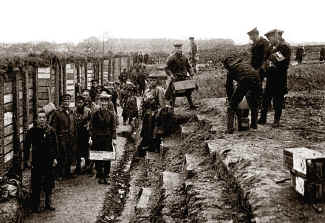|
to
English Camp page
next page
|
'Saturday afternoon
soldiers' called
upon to save Antwerp
The English Camp at Groningen, 1914 -1918 (part 1)
This series of 13 articles recounts the history of the English Camp in the city of Groningen, Holland, where British servicemen were interned during World War I. The first parts answer the question how and why these Britons ended up in Groningen.
 |
| First Royal Naval Brigade digs trenches outside Antwerp |
On 1 August 1914, a war starts that we now know as the First World War. Germany and the Austro/Hungarian Empire are at war with France, Britain and Russia. The Netherlands stays neutral, which is in Germany’s interest. They need a neutral neighbouring state through which food and other supplies can be imported.
On 4 August, Germany invades neutral Belgium. This country is the access to France, which needs to be beaten before Russia can be attacked. The small Belgian army withdraws after heavy fighting into the fortified port city of Antwerp. Hundreds of thousands of Belgian refugees have come here to flee from the German advances. The Belgian army command considers giving up Antwerp to withdraw its forces south. England is opposed to this move, as it fears that the Germans will take Belgian and French port cities. This would lose Britain its links with France, and the Germans would be a direct threat to the
British supply routes in the Channel.
Winston Churchill (as First Lord of the Admiralty) is sent to Antwerp on 2 October to tell the Belgians to hold Antwerp as long as they can. This would give England and France the opportunity to build a frontline in Northern France, to stem the German advance. The only problem is that no
British or French troops are available to support the Belgians.
During his journey, Churchill remembers that three brigades are at his disposal (numbering about 6,000 men), which he orders across personally. The 3rd Royal Naval Brigade is made up out of RN Marines (already on the continent), but the 1st and 2nd Royal Naval Brigade consist of Naval reserves, mostly young men who had voluntarily enlisted with the RNR.
The real reservists are former soldiers and stokers who used to serve in the Royal Navy; some are older than 40 years of age. The volunteers, also known as Saturday Afternoon Soldiers, are taken from all occupations. Bank- and office clerks, as well as shopkeepers. They used to go on weekly exercise with Naval officers, which they regarded as an interesting diversion from the humdrum of daily life. As soon as war breaks out, they are called up for active service.
First and Second Brigades are supplemented with fresh war volunteers (some among them are coalminers) some of whom have never handled a rifle. On arrival at the training base, they are told that they will be infantrymen. Nonetheless, they continue to use navy jargon right through the war. Their battalions are named after famous
British admirals, they take shore leave, their kitchen is always the pantry, their major is a commodore; a sergeant is a 'petty officer' and their dress codes remains naval.
On Sunday morning, 4 October 1914, Winston's Little Army (a derogatory designation of the Royal Naval Division) is called up urgently to go and save Antwerp. They are barely trained, unprepared, inexperienced and ill equipped for military action.
On 5 October, the men of 1st and 2nd RND arrive at Dunkirk. A train is ready to take them to Antwerp, where they are cheered on by the Belgians who view them as liberators. From Antwerp, they march to the frontline, to take up positions.
That same day, a battle takes place at the Nete River. The battle is lost, and the Belgian army and the Brits have to withdraw to the outer fortresses of Antwerp. This retreat enables the infamous German heavy mortars (Fat Bertha’s) to be within range of Antwerp. The superannuated fortresses do not stand a chance against the 420 mm shells, and the fall of Antwerp is only a matter of time.
Next: The First Brigade is forgotten in the evacuation of Antwerp
  to
English Camp page
to
English Camp page
|
|